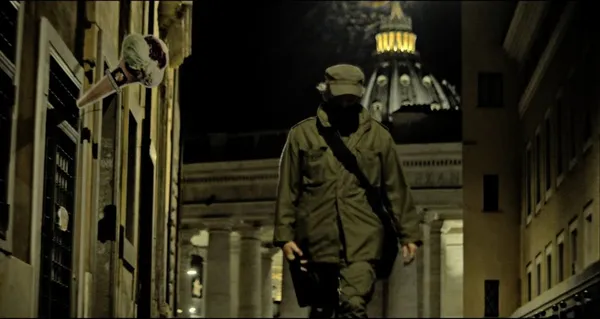 |
| Abel Ferrara on Ethan Hawke in Zeros And Ones: “He’s playing two characters so why not play a third? The actor who’s in the movie and to get to hear what he has to say.” |
The last time I spoke with Abel Ferrara was in June of this year when he was planning the theatrical US première of Siberia, starring Willem Dafoe (Abel’s Pier Paolo Pasolini in Pasolini) and his curated program called Abel Ferrara’s Cinema Village. On the eve of St. Nikolaus, Abel discussed Ethan Hawke’s prologue and epilogue in Zeros And Ones, playing brothers, quoting Abraham Lincoln, how “normal life seems so outrageous when it’s gone”, using shadows and reflections, and his upcoming project on Padre Pio.
 |
| Abel Ferrara with Anne-Katrin Titze on Willem Dafoe and Ethan Hawke; “In Siberia Willem played three people … Here Ethan is playing his brother again. And Ethan’s playing ‘Ethan’.” |
The temperature-check guns and masks and sanitizers we are all so used to by now take on an ominous quality as though the present mirrors the past of a past war and projects into a future of future violence. Zeros And Ones, shot by Abel’s longtime cinematographer Sean Price Williams, is a film of doubles. In a prologue, Ethan Hawke speaks directly to the audience, as though he were the master of ceremonies in a puppet theatre, telling the children casually how what they are going to see came about. He does so again at the end, but the two Hawkes are no longer the same, especially after we have just seen him playing two American brothers stranded in a nightly pandemic Rome. One is a soldier who looks for the other.
Women come in doubles too, or rather, resemblances. When the sound and the fury of the night melts into a soft Roman morning sky, it is time for us to take a deep breath and for the children to play and pilot the change.
From Rome, Abel Ferrara joined me on St. Nikolaus eve for an in-depth conversation on Zeros and Ones.
Anne-Katrin Titze: Hi!
Abel Ferrara: Hi, how are you doing? What’s happening?
AKT: Were you filming your new project today?
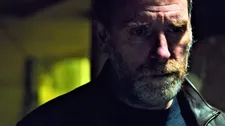 |
| Valerio Mastandrea as Luciano in Abel Ferrara’s Zeros And Ones |
AF: We’re working on it. Today’s a day off. We’re working. We shoot.
AKT: Zeros And Ones, if you had made this film in 2019, the exact same film, the reaction would have been so different. Because the world changed so much. I like very much how you were pointing us to time and how much time matters. Day and night, but also when we are perceiving a film. Was that on your mind then?
AF: It came from the pandemic. It was written and filmed then. I mean, it couldn’t have existed in 2019. It’s from that moment, you know.
AKT: When we spoke in June about Siberia, I mentioned to you that I saw the wound of the film in the scenes of the camps. In Zeros And Ones I got the impression as though WW II and the Cold War never ended. The American soldier, the Russians, everything happens as if time were standing still.
AF: You don’t have to call it a Cold War; it was never cold, it was anything but cold.
AKT: The ending of your film felt like the opposite of Antonioni’s La Notte. There, the morning reveals the disaster. In your film, the morning is hopeful. It’s the future.
AF: Right. It’s like outside the fear and the quarantine and what everyone is supposedly defending. Just normal life. Kids in a park, people drinking coffee, taxi cabs driving around. You know, but normal life seems so outrageous when it’s gone. A memory or a hope.
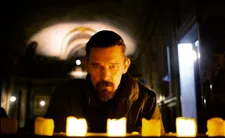 |
| Ethan Hawke as JJ in Abel Ferrara’s Zeros And Ones: “We’re using shadows, we’re using reflections. It’s what you can create in a film, maybe more than in any other medium.” |
AKT: Is that where you find grace, in normal life?
AF: I think you have a better chance of finding it there than in pointing guns at each other, blowing shit up, doing everything else that is going on during that movie.
AKT: The prologue and epilogue with Ethan Hawke are interesting. On the one hand, they are very much him. On several occasions I remember talking to Ethan and he was all lively, when I wasn’t recording. As soon as the recorder was turned on, something switched. There is a similar sudden switch in the epilogue when he tells us that this is all part of the movie. Was it the storyteller quality that interested you?
AF: The idea that film is information, that zeros and ones represents visual information, that’s what it is on a computer, it’s a mathematical reality. When I’m making a film, we’re using everything. It’s what low-budget filmmaking is about. Being real, you know? We’re open to everything. He gives an introduction to the film which seems like the right thing to use. Then it leads to the next idea, which is that he could close the film with something. He’s playing two characters so why not play a third? The actor who’s in the movie and to get to hear what he has to say.
AKT: Do you have a special relationship to doubles? There are a number of doubles in the film. Your own name, from birth, makes people connect it to another biblical name.
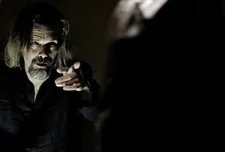 |
| Ethan Hawke as the other brother in Zeros And Ones |
AF: That’s interesting. That’s, you know, the nature of the beast. An actor, a person who is playing a role, he’s playing somebody. In Siberia Willem played three people; he played himself, he played his brother and he played his father. Here Ethan is playing his brother again. And Ethan’s playing “Ethan.” He’s filming himself, he’s in front of the camera. As you say, it’s another character.
AKT: I think you make it sound simpler than it is.
AF: You tell me! Tell me, I’m curious, what do you think?
AKT: A double is never just a repetition, it’s a resemblance. No moment is the exact repetition of another. There is always a gap or a surplus. And I like in your films that you are pushing us into that void, that in-between space between the doubles. Am I totally off?
AF: No, you’re right on. We’re using the same actor to play different things, no two events are the same, no two moments, no two takes are the same. We’re using shadows, we’re using reflections. It’s what you can create in a film, maybe more than in any other medium.
AKT: There are a few great lines in the film: “You hate trees, that’s why you hate me.” What’s your connection to trees?
AF: I don’t hate trees, I like trees. This was a line Ethan wrote. It just rang true to me. He was trying to tell these people that this is nature. What’s going on here is not natural. It’s a man-made event that’s against the law of nature.
AKT: Another line you quote in your film: “The living have to finish the work of the dead.”
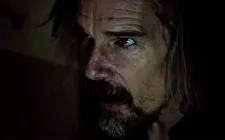 |
| Abel Ferrara: “You know, but normal life seems so outrageous when it’s gone. A memory or a hope.” |
AF: It’s Abraham Lincoln.
AKT: You agree? You feel that?
AF: Yeah, for sure! Lincoln was talking about Gettysburg. He was talking about the sacrifice that was made by the people. The victory was the Union not the separation, not slavery but freedom.
AKT: When we talked earlier this year, you mentioned to me a scene with Valerio Mastrandrea and Ethan Hawke. Now I can agree. Is Valerio in your new film as well?
AF: No, he’s not. Not yet. Maybe he might be.
AKT: We also talked about Faulkner, about the past not being past - here you have the sound and the fury. Will there be Faulkner in the next film? Sound, fury, the past?
AF: You got to see it. It’s about Padre Pio, an Italian saint who had stigmata. You know what stigmata are?
AKT: Of course.
AF: Like St. Francis. The film is about Padre Pio when he first got his stigmata during a moment of political upheaval in the eastern coast of Italy, in Puglia.
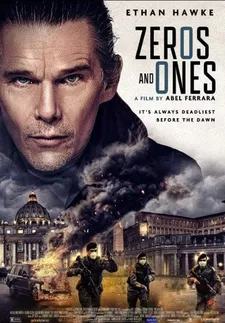 |
| Zeros And Ones poster |
AKT: When was that?
AF: 1920. So it’s a period piece.
AKT: Do you feel connected to the stigmata? I remember as a child being terrified that I would develop stigmata.
AF: You’re kidding me?
AKT: Not at all.
AF: Why did you think you would get them?
AKT: I don’t know, it was one of my childhood nightmares. I’m not even Catholic
AF: That’s crazy. I can’t wait for you to see this film!
AKT: Did you have any connections to the stigmata before this film?
AF: No, I mean I was raised Catholic, so you’re pretty aware of the wounds. They made me look at them every day of my life as a five-year-old.
AKT: Apropos, did you know that tonight is St. Nikolaus Eve?
AF: No!
AKT: The most terrifying day for children in parts of Germany, Switzerland, and Austria. St. Nikolaus comes with his golden book where he has all your sins written.
AF: Oh my God!
AKT: There are two options, either you receive gifts of apples and almonds or you will be carried off by his assistant Krampus in his big bag.
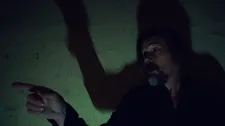 |
| Abel Ferrara: “When I’m making a film, we’re using everything.” |
AF: Oh my God, what a nightmare. Oh Jesus Christ.
AKT: You didn’t grow up with that at all?
AF: No, thank God, luckily no threat of kidnapping, no.
AKT: It’s tonight, so you better watch out.
AF: I will! When I come back to New York, we’ll grab a cup of coffee.
AKT: Yes, have a good night!
AF: I will! It was great talking to you. Thank you for watching the movie. Make sure you don’t get thrown in a bag!





















